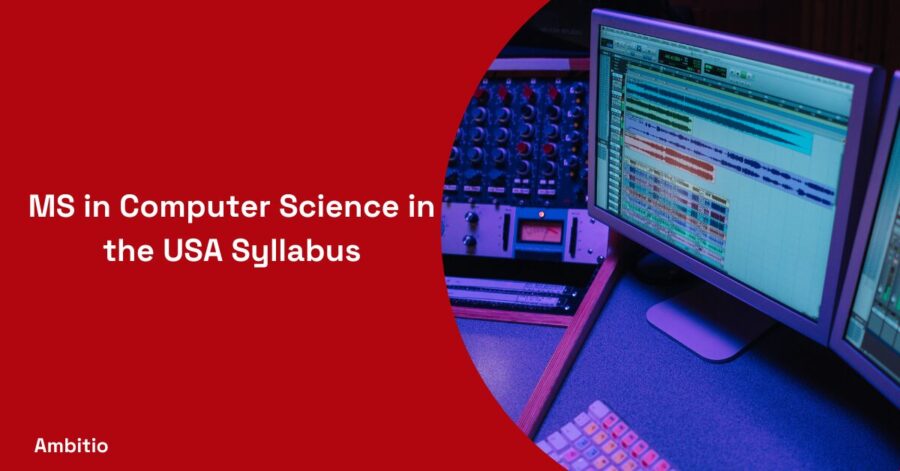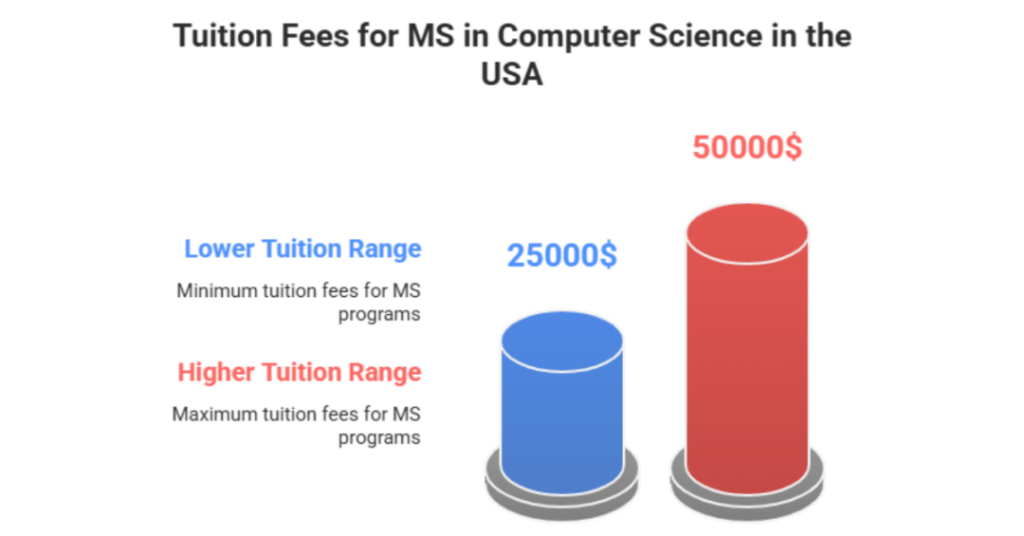10 June 2025
6 minutes read
What Is The Syllabus For MS in Computer Science In USA Of Top Universities?

Key Takeaways
- The MS in Computer Science in USA syllabus offers diverse specializations and varies across top universities, with core and elective courses tailored to specific fields.
- Tuition fees for MS can range from $25,000 to over $50,000, so it’s important to plan ahead for financial aid options.
- Understanding the eligibility for MS in computer and the program’s focus is crucial for making the right choice for your career goals.
An average Master of Science in Computer in the U.S. covers over 10 core subjects, 5+ electives, and 1 capstone/thesis—that’s not a buffet, it’s a full-course academic feast. And guess what? Every top university adds its own spice to the CS curriculum. So, if you thought all masters programs looked the same, welcome to the truth table.
Now here’s the brutal bit: most students pursuing a CS degree program have no clue what they’re really signing up for. One college throws you into AI and quantum computing by semester two, while another still teaches C in 2025. Google won’t help unless you know exactly what to search for—and no, “MS in CS syllabus” won’t cut it. This blog sorts the noise from the nuggets, breaking down what the best U.S. universities actually teach in their computer science masters program.
Core Courses in Computer Science
- Algorithms and Data Structures: Fundamental concepts in algorithm design, analysis, and data organization.
- Operating Systems: Principles of operating system design and implementation.
- Database Systems: Study of database design, models, and SQL programming.
- Programming Languages: Concepts in programming languages and their applications.
- Computer Networks: Basics of network architecture, protocols, and security.
- Software Engineering: Software development life cycle, methodologies, and project management.
- Theoretical Computer Science: Foundations of computation, complexity theory, and automata theory.
- Computer Architecture and Systems: Design and analysis of computer hardware and architecture.
Elective Courses for Specialization
- Artificial Intelligence: Explore the creation of intelligent agents and systems.
- Machine Learning: Focus on algorithms that enable computers to learn from data.
- Data Analytics: Techniques for analyzing large datasets and extracting insights.
- Cybersecurity: Study of protecting computer systems and networks from cyber threats.
- Robotics: Design and programming of robots and automated systems.
- Human-Computer Interaction: Improve user experience and interaction with technology.
- Computer Vision: Techniques for enabling computers to understand and interpret visual information.
- Quantum Computing: An emerging field focusing on developing computer technology based on quantum theory.
The advance of technology is based on making it fit in so that you don’t really even notice it, so it’s part of everyday life.
– Bill Gates, Co-founder of Microsoft
Top Universities Offering MS in Computer Science in the USA
The USA is home to some of the best universities in the world for studying computer science. These institutions are renowned for their cutting-edge research, state-of-the-art facilities, and expert faculty. Here are some of the top universities for pursuing an MS in Computer Science:
| University Name | QS World University Rankings | Specializations Offered | Annual Tuition Fees (approx.) |
|---|---|---|---|
| Massachusetts Institute of Technology (MIT) | 1 | AI, Data Science, Cybersecurity | $53,790 |
| Stanford University | 2 | Machine Learning, Human-Computer Interaction, Bioinformatics | $54,315 |
| University of California, Berkeley | 4 | Computer Graphics, Robotics, Quantum Computing | $26,544 (in-state), $41,232 (out-of-state) |
| Carnegie Mellon University | 3 | Software Engineering, Language Technologies, Computational Biology | $50,000 |
| California Institute of Technology (Caltech) | 5 | Networked Systems, Computational Neuroscience, Cryptography | $54,570 |
| Harvard University | 3 | Data Science, Artificial Intelligence, Human-Computer Interaction | $49,448 |
| Princeton University | 12 | Machine Learning, Computer Vision, Software Systems | $53,770 |
| University of Chicago | 9 | Data Analytics, Cybersecurity, Quantum Computing | $59,298 |
| Cornell University | 14 | Human-Centered Computing, Robotics, Information Science | $29,500 |
| University of Michigan | 21 | AI, Computational Theory, Human-Computer Interaction | $26,336 (in-state), $49,548 (out-of-state) |
Note: Tuition fees are approximate and subject to change. They may not include additional costs such as living expenses, books, and supplies.
What Is The Eligibility and Admission Requirements In USA?
To be eligible for an MS in Computer Science program in the USA, candidates typically need to meet the following requirements:
- A bachelor’s degree in computer science or a related field is generally required.
- Strong academic record, usually with a minimum GPA of 3.0 or equivalent.
- GRE scores are often required, with an emphasis on quantitative reasoning skills.
- English language proficiency tests like TOEFL or IELTS for non-native English speakers.
- Letters of recommendation from academic or professional references.
- A statement of purpose outlining academic interests, career goals, and reasons for choosing the program.
- Relevant work experience or research in the field of computer science can be an advantage.
For me, it’s that incredible sense of belonging and peace within your soul that really matters.
– Larry Page, Co-founder of Google
What Is Tuition Fees and Financial Aid?
The cost of pursuing an MS in Computer Science in the USA can vary depending on the university and program. However, many universities offer financial aid in the form of scholarships, assistantships, and grants to deserving students. International students should also explore funding options available in their home countries.

- Tuition fees for an MS in Computer Science in the USA vary between universities and may range from $25,000 to over $50,000 per year.
- Financial aid options include scholarships, grants, fellowships, teaching assistantships, and research assistantships.
- Many universities offer need-based and merit-based financial aid to both domestic and international students.
- Students are encouraged to apply for external scholarships and explore funding opportunities in their home countries.
- Work-study programs and part-time employment on campus can also help offset educational expenses.
Scholarships and Financial Aids
| Scholarship Name | University/Organization | Description | Eligibility |
|---|---|---|---|
| Fulbright Foreign Student Program | US Government | Provides grants for graduate study in the USA. | International students from eligible countries. |
| Knight-Hennessy Scholars | Stanford University | Offers full funding for graduate studies at Stanford. | All nationalities, demonstrating leadership and civic commitment. |
| Berkeley Graduate Division Fellowships | University of California, Berkeley | Awards funding to outstanding graduate students. | Merit-based for students in graduate programs. |
| MIT Graduate Fellowship | Massachusetts Institute of Technology | Provides financial support to graduate students. | Merit-based for incoming graduate students. |
| Carnegie Mellon University Fellowships | Carnegie Mellon University | Offers various fellowships for graduate students. | Based on academic excellence and research potential. |
| Caltech Graduate Fellowship | California Institute of Technology | Funds graduate study for high-achieving students. | Merit-based for students in full-time graduate programs. |
Note: Scholarship details are subject to change and may have specific application requirements and deadlines. Students should check the respective university or organization websites for the most current information.
Did You Know?
The demand for computer science professionals is expected to grow significantly, with the U.S. Bureau of Labor Statistics projecting a 13% growth from 2020 to 2030 in computer and information technology occupations, faster than the average for all occupations.
Career Prospects After Completing the MS in Computer Science
Graduates of MS in Computer Science programs are highly sought after in various sectors, including technology companies, research institutions, and government agencies.
Career opportunities include roles such as software engineer, data scientist, systems analyst, and research scientist. The degree also opens doors to doctoral studies for those interested in academic careers.
| Career Role | Industry/Field | Description | Average Salary (approx.) |
|---|---|---|---|
| Software Engineer | Technology Companies | Develops software solutions and applications. | $106,000 |
| Data Scientist | Business, Finance, Healthcare | Analyzes complex data sets to drive decision-making. | $122,000 |
| Systems Analyst | IT Services, Corporations | Evaluate and improve computer systems for businesses. | $88,000 |
| Research Scientist | Academia, Research Institutes | Conducts research in computer science and related fields. | $118,000 |
| Machine Learning Engineer | AI and Tech Companies | Develops and implements machine learning models. | $112,000 |
| Cybersecurity Analyst | Government, Security Firms | Protects information systems from cyber threats. | $99,000 |
| Network Architect | Telecommunications, IT | Designs and builds data communication networks. | $120,000 |
| User Experience (UX) Designer | Software Development, Web Services | Enhances user experience in software and web applications. | $95,000 |
Note: Salaries are approximate averages and can vary based on location, experience, and other factors.
Conclusion
MS in CS in the USA for MS in computer offers immense opportunities, but the computer science curriculum varies across universities in the USA. Whether you’re interested in computer security, machine learning, computer vision, or other computer science subjects, each MS in Computer Science program is designed differently, with unique core courses and elective courses.
For students who want to pursue a master’s in computer science, understanding the eligibility for MS in computer, tuition fees for MS, and the course and university structure is key. The msc computer science syllabus may vary, but it’s crucial to know how each program aligns with your goals in the field of computer science. Whether you’re applying to top universities in the US or considering colleges in the USA, making an informed choice is essential for a successful MS degree journey.
Craft your success narrative with Ambitio Elite. Personalized guidance, AI-driven strategies, and expert mentorship await. Enroll now to elevate your academic journey! Join Ambitio Elite
FAQs
What differentiates the MS in Computer Science program in the USA from other countries?
The USA’s MS in Computer Science programs are known for their emphasis on practical experience, cutting-edge research, and collaboration with industry leaders. This approach provides students with a unique blend of theoretical knowledge and real-world skills.
Can students customize their MS in Computer Science syllabus in the USA?
Yes, most universities offer flexibility in course selection, allowing students to tailor their curriculum based on their interests and career goals. This customization typically includes choosing elective courses and specialization tracks.
Are there opportunities for research and internships during the MS program?
Absolutely. Many programs integrate research projects and internships, providing students with hands-on experience and industry exposure. These opportunities are invaluable for building a strong professional network and enhancing employability.
What is the duration of an MS in Computer Science program in the USA?
The program typically spans 1.5 to 2 years, although this can vary depending on the university, course structure, and whether the student is enrolled full-time or part-time.
How does the MS in Computer Science degree enhance career prospects?
An MS in Computer Science degree from a reputable university in the USA significantly boosts job opportunities and earning potential. Graduates are well-equipped to tackle complex technological challenges and take on leadership roles in the tech industry.

You can study at top universities worldwide!
Get expert tips and tricks to get into top universities with a free expert session.
Book Your Free 30-Minute Session Now! Book a call now




























